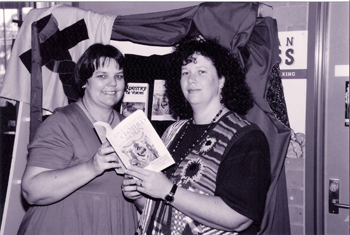
WHAT STARTED as planning a simple conference for the Assembly agency The Commission on Women and Men (later renamed Gospel and Gender) turned into a gathering that shook the foundation of what it meant to be a Christian woman
in Australia.
The 1996 gathering, Women Clothed with the Sun, held during a steamy Brisbane January, is still remembered fondly as the place many women changed the way they saw their faith, world, church and themselves.
One of the organisers, Colleen Geyer, said the group set out to run a conference like no one had experienced before.
“If this was about reframing the church and how it understood who it was, could you do that with the event itself?” said Ms Geyer, who is now Blue Care Director of Mission.
“It was about what language we would use to describe it.
What would the images be that we would use?
How would the event happen if it wasn’t a conference with keynote speakers?
That was how everything was run at the time, and still is today.
“It wasn’t a conference, it was a gathering.
There weren’t sessions with events, there were spaces to explore the story.
It didn’t focus on an issue or conference theme, it focused on a passage in the Bible that wasn’t really used in the wider church (Revelation 12:1).
“How could we have Indigenous women as part of the planning so that their stories and reflections infl uenced how we
would run the event?
“How do you re-vision worship to make it something that was enough about what we understood of worship but used music and form that would inspire us as well?”
Ms Geyer still has women wanting to talk to her about the gathering.
“I have women from all over Australia say, ‘Women Clothed with the Sun was the beginning of me changing how I thought about my faith’, or ‘I’ve grown so much since then.
I can’t believe I’m the same woman I was before I went’.
“I also have people say, ‘I’m one of the ones who never came’ and I’m really sad about that.
“When you are involved in something like that you don’t understand what is going to be the impact and how it will keep
having an influence on people’s lives.
“There were amazing things that came out of it as well.
There was a language change, resources, worship, a music group that recorded.
Things like that impacted people’s lives.
Rev Yvonne McRostie, minister with the South East Uniting Church Community in Brisbane, said the gathering altered many aspects of her life.
“I was mainly involved in the music.
I was young (30) and quite a new student.
I hadn’t really gotten into the whole feminist theology,” she said.
“It was like I had been given an opportunity to be something that I always knew that I was, but had never really been given
permission to express it or to say it or be a ‘woman’.
“It was really quite eyeopening.
Through the music I think a lot of people felt that.
“The type of music that we were singing was quite rhythmic and very repetitive.
We had great musicians who were able to write songs that reflected the freedom of being a woman.”
Ms McRostie was part of the music group, Seeds of Wild Honey, which formed as a result of the gathering.
Rev Wendi Sargeant was a Minister of the Word candidate on field placement in Brisbane at the time of the gathering.
The minister she was working with refused to let her attend.
“It was considered to be ‘a bit radical’ and ‘not really something that would contribute to your learning’, ” she said.
“At the time I felt disappointed because a number of my friends from college were going. That disappointment has only increased over the years.
People still talk about this gathering as a turning point in their lives and ministries.”
Looking back, Ms Geyer said the church still has more to learn.
“I think there is an amazing difference in where women can be in the church,” she said.
“The Uniting Church has always believed that there is equality for the genders holding leadership positions and in representation, but we still, even today, struggle with that.
“One of the big issues was around inclusive language.
How do we see that in our scriptures and documents?
The Basis of Union was rewritten in 1992.
“But there are still places where we say ‘language has to be this way or it is not the right way’, instead of saying ‘language can be used in many different ways to help us have a rich and varied experience of what our Christian faith could be’.
“I still think that its message to the Church was that we can be creative and innovative and we can think of new ways of being and doing that don’t take away from what is the core of our faith.”
It is a message we still need to hear.
Photo : Jayne Clapton (left) and Colleen Geyer prepare for the gathering. Photo courtesy of the Journey archives
 JourneyOnline
JourneyOnline






